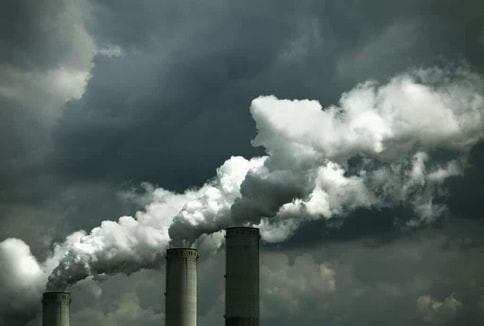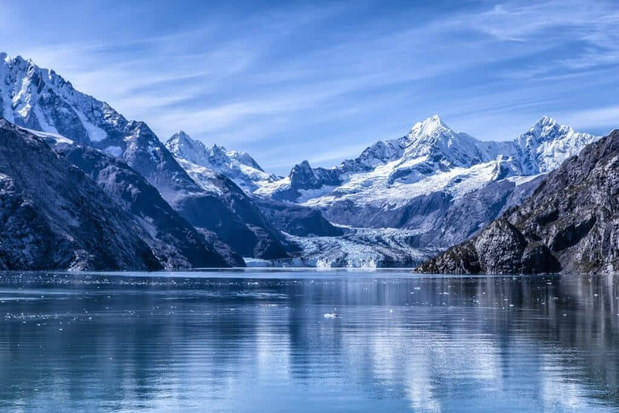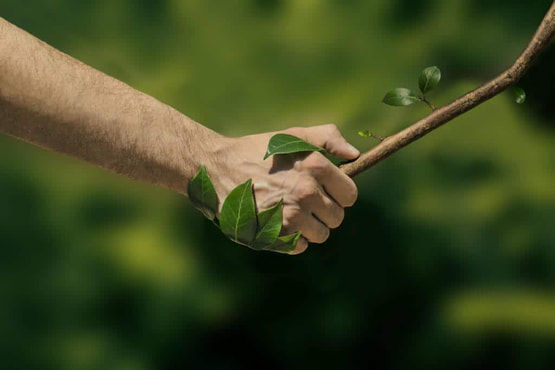
Excerpts selected by editors of the American Energy Society.
Some experiences are so intense while they are happening that time seems to stop altogether. When it begins again and our lives resume their normal course, those intense experiences remain vivid, refusing to stay in the past, remaining always and forever with us.
Seventeen years ago my youngest child was badly – almost fatally – injured. This is a story I have told before, but its meaning for me continues to change and to deepen.
That is also true of the story I have tried to tell for many years about the global environment. It was during that interlude 17 years ago when I started writing my first book, Earth in the Balance. It was because of my son’s accident and the way it abruptly interrupted the flow of my days and hours that I began to rethink everything, especially what my priorities had been. Thankfully, my son as long since recovered completely. But it was during that traumatic period that I made at least two enduring changes: I vowed always to put my family first, and I also vowed to make the climate crisis the top priority of my professional life.
Unfortunately, in the intervening years, time had not stood still for the global environment. The pace of destruction has worsened and the urgent need for a response had grown more acute.
The fundamental outline of the climate crisis story is much the same now as it was then. The relationship between human civilization and the Earth has been utterly transformed by a combination of factors, including the population explosion, the technological revolution, and a willingness to ignore the future consequences of our present actions. The underlying reality is that we are colliding with the planet’s ecological system, and its most vulnerable components are crumbling as a result.
Some experiences are so intense while they are happening that time seems to stop altogether. When it begins again and our lives resume their normal course, those intense experiences remain vivid, refusing to stay in the past, remaining always and forever with us.
Seventeen years ago my youngest child was badly – almost fatally – injured. This is a story I have told before, but its meaning for me continues to change and to deepen.
That is also true of the story I have tried to tell for many years about the global environment. It was during that interlude 17 years ago when I started writing my first book, Earth in the Balance. It was because of my son’s accident and the way it abruptly interrupted the flow of my days and hours that I began to rethink everything, especially what my priorities had been. Thankfully, my son as long since recovered completely. But it was during that traumatic period that I made at least two enduring changes: I vowed always to put my family first, and I also vowed to make the climate crisis the top priority of my professional life.
Unfortunately, in the intervening years, time had not stood still for the global environment. The pace of destruction has worsened and the urgent need for a response had grown more acute.
The fundamental outline of the climate crisis story is much the same now as it was then. The relationship between human civilization and the Earth has been utterly transformed by a combination of factors, including the population explosion, the technological revolution, and a willingness to ignore the future consequences of our present actions. The underlying reality is that we are colliding with the planet’s ecological system, and its most vulnerable components are crumbling as a result.
….
On every corner of the globe – on land and in water, in melting ice and disappearing snow, during heat waves and droughts, in the eyes of hurricanes and in the tears of refugees – the world is witnessing mounting and undeniable evidence that nature’s cycles are profoundly changing.
I have learned that, beyond death and taxes, there is at least one absolutely indisputable fact: Not only does human-caused global warming exist, but it is also growing more and more dangerous, and at a pace that has now made it a planetary emergency.
I have learned that, beyond death and taxes, there is at least one absolutely indisputable fact: Not only does human-caused global warming exist, but it is also growing more and more dangerous, and at a pace that has now made it a planetary emergency.
….
After more than thirty years as a student of the climate crisis, I have a lot to share. I have tried to tell this story in a way that will interest all kinds of readers. My hope is that those read the book and see the film will begin to feel, as I have for a long time, that global warming is not just about science and that it is not just a political issue. It is really a moral issue.
….
The climate crisis is… extremely dangerous. Two thousand scientists, in a hundred countries, working for more than 20 years in the most elaborate and well-organized scientific collaboration in the history of humankind, have forged an exceptionally strong consensus that all the nations on Earth much work together to solve the crisis of global warming.
The voluminous evidence now strongly suggests that unless we act boldly and quickly to deal with the underlying causes of global warming, our world will undergo a string of terrible catastrophes, including more and stronger storms like Hurricane Katrina, in both the Atlantic and the Pacific.
The voluminous evidence now strongly suggests that unless we act boldly and quickly to deal with the underlying causes of global warming, our world will undergo a string of terrible catastrophes, including more and stronger storms like Hurricane Katrina, in both the Atlantic and the Pacific.
We are melting the North Polar ice cap and virtually all the mountain glaciers in the world. We are destabilizing the massive mound of ice on Greenland and the equally enormous mass of ice propped up on top of islands in West Antarctica, threatening a worldwide increase in sea levels of as much as 20 feet.
The list of what is now endangered due to global warming also includes the continued stable configuration of ocean and wind currents that has been in place since before the first cities were build almost 10,000 years ago.
We are dumping so much carbon dioxide into the Earth’s environment that we have literally changed the relationship between the Earth and the Sun. So much of that CO2 is being absorbed into the oceans that if we continue at the current rate we will increase the saturation of calcium carbonate to levels that will prevent formation of corals and interfere with the making of shells by any sea creature.
Global warming, along with the cutting and burning of forests and other critical habitats, is causing the loss of living species at a level comparable to the extinction event that wiped out the dinosaurs 65 million years ago. That event was believed to have been caused by a giant asteroid. This time it is not an asteroid colliding with the Earth and wreaking havoc; it is us.
Last year, the National Academies of Science in the 11 most influential nations came together to jointly call on every nation to “acknowledge that the threat of climate change is clear and increasing” and declare that the “scientific understanding of climate changes is now sufficiently clear to justify nations taking prompt action.”
So the message is unmistakably clear. This crisis means “danger!”
Why do our leaders seem not to hear such a clear warning? It is simply that it is inconvenient for them to hear the truth?
If the truth is unwelcome, it may seem easier just to ignore it.
But we know from bitter experience that the consequences of doing so can be dire….
As Martin Luther King Jr. said in a speech not long before his assassination:
“We are now faced with the fact, my friends, that tomorrow is today. We are confronted with the fierce urgency of now. In this unfolding conundrum of life and history, there is such a thing as being too late.”
The list of what is now endangered due to global warming also includes the continued stable configuration of ocean and wind currents that has been in place since before the first cities were build almost 10,000 years ago.
We are dumping so much carbon dioxide into the Earth’s environment that we have literally changed the relationship between the Earth and the Sun. So much of that CO2 is being absorbed into the oceans that if we continue at the current rate we will increase the saturation of calcium carbonate to levels that will prevent formation of corals and interfere with the making of shells by any sea creature.
Global warming, along with the cutting and burning of forests and other critical habitats, is causing the loss of living species at a level comparable to the extinction event that wiped out the dinosaurs 65 million years ago. That event was believed to have been caused by a giant asteroid. This time it is not an asteroid colliding with the Earth and wreaking havoc; it is us.
Last year, the National Academies of Science in the 11 most influential nations came together to jointly call on every nation to “acknowledge that the threat of climate change is clear and increasing” and declare that the “scientific understanding of climate changes is now sufficiently clear to justify nations taking prompt action.”
So the message is unmistakably clear. This crisis means “danger!”
Why do our leaders seem not to hear such a clear warning? It is simply that it is inconvenient for them to hear the truth?
If the truth is unwelcome, it may seem easier just to ignore it.
But we know from bitter experience that the consequences of doing so can be dire….
As Martin Luther King Jr. said in a speech not long before his assassination:
“We are now faced with the fact, my friends, that tomorrow is today. We are confronted with the fierce urgency of now. In this unfolding conundrum of life and history, there is such a thing as being too late.”
….
But along with the danger we face from global warming, this crisis also brings unprecedented opportunities.
What are the opportunities such a crisis also offers? They include not just new jobs and new profits, though there will be plenty of both, we can also build clean engines, we can harness the Sun and the wind; we can stop wasting energy; we can use our planets plentiful coal resources without heating the planet.
The procrastinators and deniers would have us believe this will be expensive. But in recent years, dozens of companies have cut emissions of heat-trapping gases while saving money. Some of the world’s largest companies are moving aggressively to capture the enormous economic opportunities offered by a clean energy future.
But there’s something even more precious to be gained if we do the right thing.
What are the opportunities such a crisis also offers? They include not just new jobs and new profits, though there will be plenty of both, we can also build clean engines, we can harness the Sun and the wind; we can stop wasting energy; we can use our planets plentiful coal resources without heating the planet.
The procrastinators and deniers would have us believe this will be expensive. But in recent years, dozens of companies have cut emissions of heat-trapping gases while saving money. Some of the world’s largest companies are moving aggressively to capture the enormous economic opportunities offered by a clean energy future.
But there’s something even more precious to be gained if we do the right thing.
….
The climate crisis also offers us the chance to experience what very few generations in history have had the privilege of knowing: a generational mission; the exhilaration of a compelling moral purpose; a shared and unifying cause; the thrill of being forced by circumstances to put aside the pettiness and conflict that so often stifle the restless human need for transcendence; the opportunity to rise.
When we do rise, it will fill our spirits and bind us together. Those who are now suffocating in cynicism and despair will be able to breathe freely. Those who are now suffering from a loss of meaning in their lives will find hope.
When we rise, we will experience an epiphany as we discover that this crisis is not really about politics at all. It is a moral and spiritual challenge.
At stake is the survival of our civilization and the habitability of the Earth. Or, as one eminent scientist put it, the pending question is whether the combination of an opposable thumb and a neocortex is a viable combination on this planet.
When we do rise, it will fill our spirits and bind us together. Those who are now suffocating in cynicism and despair will be able to breathe freely. Those who are now suffering from a loss of meaning in their lives will find hope.
When we rise, we will experience an epiphany as we discover that this crisis is not really about politics at all. It is a moral and spiritual challenge.
At stake is the survival of our civilization and the habitability of the Earth. Or, as one eminent scientist put it, the pending question is whether the combination of an opposable thumb and a neocortex is a viable combination on this planet.
Al Gore’s An Inconvenient Truth was released in 2006. Excerpts from the introduction, pp. 8-11.




